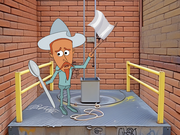泼出去的水
Characters and words in 泼出去的水
to go out / to come out / to occur / to produce / to go beyond / to rise / to put forth / to happen / (used after a verb to indicate an outward direction or a positive result) / classifier for dramas, plays, operas etc
出
=
屮
+
凵
:
Mnemonic symbol: 出 tilted 90 degrees looks like "EE". "EE" is an abbreviation for "emergency exit". In front of the space station (Ø1) Chantal Chicken (chu) plugged her thornbush (屮) into a receptacle (凵), but it short circuited and immediately caught fire. Chantal has no option but to use the emergency exit (出) she came out of to go back into the space station.
to go / to go to (a place) / (of a time etc) last / just passed / to send / to remove / to get rid of / to reduce / to be apart from in space or time / to die (euphemism) / to play (a part) / (when used either before or after a verb) to go in order to do sth / (after a verb of motion indicates movement away from the speaker) / (used after certain verbs to indicate detachment or separation)
去
=
厶
+
土
:
Mnemonic symbol: The "nose" part (厶) can be seen as an arm, which goes through "earth" (土), and this reminds me of some protesters who lock themselves (or their arms, to be specific) to concrete barrels. Cupids dirt capsule could also be a concrete barrel. So in other characters, I'm going to represent 去 by a concrete barrel.
Cupid (qu) is trying to send himself to earth. In the bathroom of the space station (Ø4), he has prepared a capsule made of dirt (土). He's wearing his lucky fake nose (厶) when entering the capsule.
Cupid (qu) is trying to send himself to earth. In the bathroom of the space station (Ø4), he has prepared a capsule made of dirt (土). He's wearing his lucky fake nose (厶) when entering the capsule.
of; ~'s (possessive particle) / (used after an attribute) / (used to form a nominal expression) / (used at the end of a declarative sentence for emphasis) / also pr. [di4] or [di5] in poetry and songs
water / river / liquid / beverage / additional charges or income / (of clothes) classifier for number of washes
水
=
㇇
+
亅
+
丿
+
㇏
:
Sheldon Shrimp just climbed the Eiffel Tower. He's really thirsty, so he's glad to find a water fountain. After he quenches his thirst, he also finds a snack: A banana is swimming in the water. He never ate a banana before, so he tries a mix of different methods: Putting on a fake beak to pick on the banana, holding it with a finger and peeling it with a crowbar.
Words with 泼出去的水
泼出去的水
is not used as a component in another word.
Sentences with 泼出去的水
泼出去的水 currently does not appear in any sentence.
